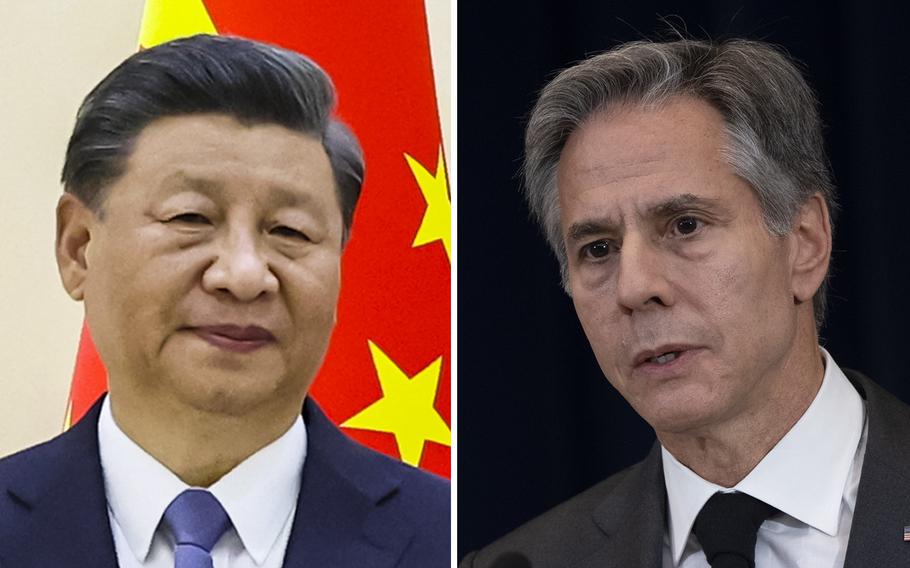
Chinese President Xi Jinping, left, and U.S. Secretary of State Antony Blinken. (Left: Sputnik, Kremlin Pool; Right: U.S. Defense Department)
Expectations were always low that a visit to Beijing by U.S. Secretary of State Antony Blinken would have halted the downward trajectory of U.S.-China ties, since the two countries had always had fundamentally different objectives for the high-level meeting.
The two-day trip had been set to begin on Sunday when new tensions emerged ultimately leading it to be postponed. Pentagon officials disclosed the discovery of a possible Chinese spy balloon flying above the continental United States. The Chinese Foreign Ministry later described it as a "civilian airship used for research, mainly meteorological purposes" that had been blown off course.
Even before the postponement, however, commentators in China pointed to a hardening U.S. attitude toward Beijing, citing export controls targeting Chinese technology, expanded U.S. military access to the Philippines and a planned visit to Taiwan by U.S. House Speaker Kevin McCarthy. In an editorial Wednesday, the state-run People's Daily said the United States must drop its "obsession" with containing China.
While U.S. officials had hoped to establish guardrails to prevent tensions from spiraling into conflict, Beijing wants to reset the relationship on the basis of broad principles that would make issues like Taiwan or Chinese territorial claims in the South China Sea off-limits.
"It's like we are using two different yardsticks," said Rorry Daniels, managing director of the Asia Society Policy Institute in New York. "The two sides are agreed that it would be useful for ourselves and for the world to manage the relationship responsibly. But for the modus operandi, there's a big gap of what the expectations are."
Here are three things that China wanted out of the meeting and any future Blinken visit:
Establish the red lines
For China, agreeing to prevent a crisis is not enough. Chinese leaders, diplomats and experts have repeatedly said that a fundamental reset is necessary to repair ties. Since Chinese leader Xi Jinping met with President Biden in Bali at the Group of 20 summit in November, Beijing has ramped up calls for a new "fundamental framework" of the relationship based on lofty principles like peaceful coexistence or mutual respect.
"Only with principles can we have direction, and only with direction can we properly handle differences and expand cooperation," the People's Daily wrote on Wednesday, paraphrasing comments Xi made to Biden during that meeting.
The goal for any future meeting will be to set a new tone for the next few decades - one where Washington would be obliged to respect China's core interests including its claims over Taiwan and the South China Sea, crackdowns in Hong Kong and Xinjiang, or its approach to human rights issues.
"That is the core thing they want because once they have those principles and framework in place they can protect their bottom line," said Yun Sun, the director of the China program at the Stimson Center in Washington D.C. "They want to draw lines. They want to tell the Americans there are certain things you cannot do and cannot say."
"The U.S. is much more focused on specific issues - what we can do together on specific issues - and the Chinese will say let's talk about the fundamental framework of our relations first."
Show that China is back
After almost three years of severe "zero covid" policies that have paralyzed the economy, improving ties with the United States is a way to show that China is open again for business.
"After zero covid, this is the year for China to fight for its economy. So it's China's hope that the two sides can ease tensions on the trade and economic front," said Zhao Minghao, professor at the Institute of International Studies at Fudan University in Shanghai.
Since the reopening, Beijing has been keen to showcase its return to the global stage. Blinken had been expected to meet Xi, which would have made him the first U.S. secretary of state to meet the Chinese leader in years, after Mike Pompeo was snubbed in 2018.
At the same time, China would have aimed to show that its leaders were standing up to U.S. pressure on Beijing to use its influence over Russia or North Korea. "We need to remind the U.S. that it cannot demand communication and cooperation from China while interfering in China's internal affairs and hurting China's interests," said Mao from the Foreign Ministry on Monday.
"The Chinese government wants to show its own public that it can be tough with the United States on areas where the U.S. and China don't agree and that it can manage that toughness with a real open channel of dialogue," Daniels said.
Stop those Taiwan trips
Chinese officials this week have already called on the "relevant people" to stop McCarthy's plans to visit Taiwan later this year. China, which claims the de facto country as its sovereign territory, sees the visit as a violation of agreements between Washington and Beijing in which the United States said it would not support Taiwan independence.
McCarthy's visit comes after that of former house speaker Nancy's Pelosi's trip in August, which was followed by days of Chinese military drills surrounding the main island.
To China, such visits represent a worrying trend, while to Washington, China's saber-rattling over the visits signals looming conflict. In a memo leaked last weekend, a U.S. Air Force commander said he believed the United States would engage in a war with Beijing over Taiwan in the next two years.
"A very big problem for both sides now is that neither feels that they are misjudging the other party," said Zhao.
"China believes that the United States wants to establish one China and one Taiwan, and the United States believes China wants to take back Taiwan by force. This is the most troublesome deadlock right now."
The Washington Post's Lyric Li in Seoul contributed to this report.